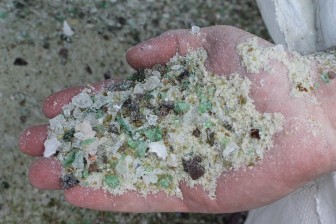Why Is It So Hard to Recycle Glass in Alabama?
Glass is a part of our daily lives. It’s in our refrigerators and our cabinets. We eat off it. We drink out of it. It’s everywhere. Everywhere but in our recycling bins, and that’s because the majority of waste services in Alabama don’t recycle glass.
But that’s not the case at the Alabama Environmental Council’s recycling center, where it’s a little noisier these days because of their new glass pulverizer. A mixture of glass, sand, and water travels along a 16-foot conveyor belt that carries it up and drops it into a large dumpster where it gets ground down.
“It crushes it down to a [less than] three-eighths-inch product, which is safe to touch, safe to walk on,” says Michael Churchman, Executive Director of the Alabama Environmental Council (AEC).
AEC, Greater Birmingham’s only glass recycler, had stopped taking glass in 2012 because the market for recycled glass had fallen, partly because its use in cement decreased. “[And that’s what] ultimately lead to us having to shut that operation down and look for a better way to make glass recycling work,” he continues.
But public demand for glass recycling remains steady. There’s an economic side to it that most people don’t understand, though. For example, says Churchman, there’s no market for recycled glass in Alabama. The AEC, which resumed taking glass this spring, charges a fee that helps cover the cost to ship it out of state. Most of the glass collected goes to a sandblasting company in Tennessee.
Sam Dillendard of Santek Waste Services in Gardendale says shipping recycled glass is cost-prohibitive for most waste disposal companies, and partnering with AEC’s small operation is especially so.
“Unfortunately, they can’t handle the volume of total recyclables that we deliver at one time,” Dillendard says.
There are other factors limiting glass recycling in Alabama. For example, glass is heavy, so it’s expensive to haul, and sorting it often comes with risks to workers or to people dropping it off. While the AEC is a separate drop-off location, most waste industries, including Santek, do something called single-stream recycling. That’s where recyclables, such as aluminum, plastic, and paper, are put in one bin together and then sorted later at a Material Recovery Facility or MRF.
“Our sort line is not set up to separate the glass,” says Leigh Shaffer of Birmingham Recycle and Recovery, a nearby MRF. “So actually if glass does end up in the stream, it ends up as waste and gets hauled to the landfill, along with all the other contamination.”
Even if they were set up to sort glass, there’s no one in the state to take it at that stage of the process, she says.
And that’s something the Alabama Environmental Council is trying to change by raising awareness of the benefits of glass recycling, and just by providing the service.
Lindsey Vonn says she suffered ‘complex tibia fracture’ in her Olympic downhill crash
The 41-year-old star said her torn ACL was not a factor in her crash. "While yesterday did not end the way I had hoped, and despite the intense physical pain it caused, I have no regrets," she wrote.
Guerilla Toss embrace the ‘weird’ on new album
On You're Weird Now, the band leans into difference with help from producer Stephen Malkmus.
Nancy Guthrie search enters its second week as a purported deadline looms
"This is very valuable to us, and we will pay," Savannah Guthrie said in a new video message, seeking to communicate with people who say they're holding her mother.
Immigration courts fast-track hearings for Somali asylum claims
Their lawyers fear the notices are merely the first step toward the removal without due process of Somali asylum applicants in the country.
Ilia Malinin’s Olympic backflip made history. But he’s not the first to do it
U.S. figure skating phenom Ilia Malinin did a backflip in his Olympic debut, and another the next day. The controversial move was banned from competition for decades until 2024.
‘Dizzy’ author recounts a decade of being marooned by chronic illness
Rachel Weaver worked for the Forest Service in Alaska where she scaled towering trees to study nature. But in 2006, she woke up and felt like she was being spun in a hurricane. Her memoir is Dizzy.






